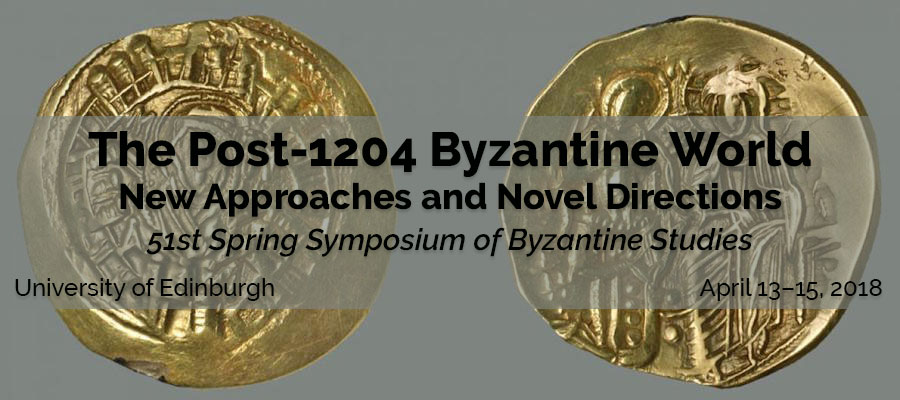The Post-1204 Byzantine World: New Approaches and Novel Directions, 51st Spring Symposium of Byzantine Studies, University of Edinburgh, April 13–15, 2018
The 51st Spring Symposium of Byzantine Studies, under the auspices of the Society for the Promotion of Byzantine Studies, will return to Edinburgh for the third time, after Prof. Michael Angold’s The Byzantine Aristocracy, IX–XIII Centuries in 1982 and Prof. Jim Crow’s The Archaeologies of Byzantium in 2008.
The 2018 symposium will be dedicated to the late Byzantine world, taking its starting point from the cataclysmic events of 1204.
Especially in recent years, the late Byzantine period has seen an increasing amount of exciting research activity: from continuing Grundlagenforschung (palaeography, critical editions, translations and commentaries) via the reevaluation of key social, political, and economic practices to the application of new methods such as network studies or sociolinguistics, our understanding of the society and politics of the final two hundred and fifty years of Roman rule in the eastern Mediterranean have much increased. If down to the late 1990s Laskarid and Palaiologan Byzantium was often still perceived as one of the (many) Cinderellas of Byzantine Studies, this is clearly no longer the case. Wherever one looks these days, exciting postgraduate projects are under way; in an increasing number of universities, Byzantine Studies is taught by colleagues with expertise in the later Byzantine period.
The 51st Spring Symposium of Byzantine Studies seeks to take stock of these novel approaches to the post- 1204 Byzantine world by bringing together established researchers, new voices, and open communications on all aspects of this newly polycentric world that stretched from Constantinople to Mystras and from Arta to Trebizond: we will explore the functioning of late Byzantine politics – the interaction of emperors and rulers with aristocratic, ecclesiastical, urban elites and the dēmos – look at the cultural, religious, and literary life in the various post-1204 polities from various angles, and explore the fragile position of the dwindling Eastern Roman polities in their wider Mediterranean context, from the Italian powers via the Balkans to the Mamluks, Ottomans, and Mongols.
The 51st Spring Symposium invites contributions for ‘New Voices’ papers and Communications on any of these themes and warmly invites abstracts from scholars within and without the UK and in fields linked to Byzantine studies.
‘New Voices’ papers (20 minutes) are open to post-doctoral scholars as well as doctoral students in the final year of dissertation writing and should introduce an aspect of current research pertinent to the Symposium theme. They will be considered for publication in the Symposium proceedings alongside main papers (subject to peer review). Communications (10 minutes) are open to everybody, and will not normally be published.
